| Reviews & Columns |
|
Reviews DVD TV on DVD Blu-ray 4K UHD International DVDs In Theaters Reviews by Studio Video Games Features Collector Series DVDs Easter Egg Database Interviews DVD Talk Radio Feature Articles Columns Anime Talk DVD Savant Horror DVDs The M.O.D. Squad Art House HD Talk Silent DVD
|
DVD Talk Forum |
|
|
| Resources |
|
DVD Price Search Customer Service #'s RCE Info Links |
|
Columns
|
|
|
Eclipse Series 38: Masaki Kobayashi Against the System
THE MOVIES:
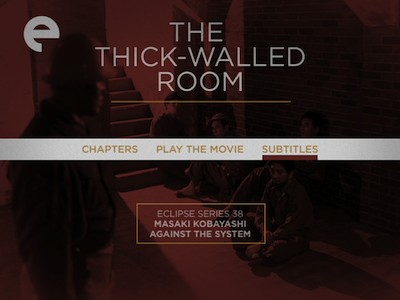
Japanese movies made after World War II that deal directly with the post-War conditions following the country's defeat and grappling with the U.S. occupation offer a unique glimpse into a particular time and place that you can't really find anywhere else. I'd suggest the closest equivalent is American-made movies about Vietnam and the climate of unrest that existed as a result of that conflict. Perhaps if movies had been around after the U.S. Civil War, a Southern cinema might have emerged that would have been akin to what Masaki Kobayashi, Seijun Suzuki, and others created in the 1950s and 1960s. They engaged their nation's shame and struggles honestly, rather than the self-mythologizing that we see in American westerns that feature former Confederate soldiers as protagonists.
The Eclipse boxed set Masaki Kobayashi Against the System, as its name suggests, is meant to collect early Kobayashi films that wrestled with difficult and sometimes controversial subjects. The set leads with his third film, the 1956 drama The Thick-Walled Room, a prison story written by acclaimed novelist Kobo Abe (The Face of Another). In particular, The Thick-Walled Room casts its eye on men who have been tried as war criminals and sentenced to an indefinite stay in Sugamo Prison. A handful of them share a bare cell, the thick-walled room of the title, under guard of the American soldiers who run the place. They dream of their eventual release, and a righting of the wrong that was done to them.
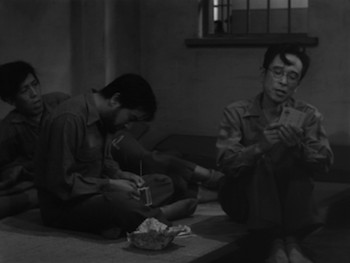
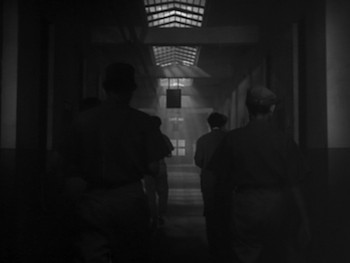
Kobayashi and Abe tell their stories through a narrative that alternates between the day-to-day of prison life and flashbacks. As we get to know the characters in the present, we also see their past. Most importantly, we are shown the so-called crimes that got them incarcerated. The bitter sting of their predicament is that, for the most part, these are soldiers who were pushed into heinous acts by bullying officers. The higher-ranking men got away scot-free, leaving their subordinates holding the bag. The resultant anger that this naturally causes is stoked further as a peace treaty with the U.S. granting Japan further independence uses these poor souls as sacrificial pawns. They will stay in jail and do a nation's penance. (The Thick-Walled Room did penance, as well: though made in 1952, it wouldn't see the light of day until 1956 out of fear it would offend the lingering Americans.)
As with any such ensemble drama, The Thick-Walled Room presents a diverse cast of personalities. Kimura (Tsutomu Shimonoto) is a poet, while Nishimura is a smartass. There aren't just Japanese men in Sugamo: Kyo is a Korean soldier who was in the wrong place at the wrong time. Others shun him for being a Communist, particularly as the news of the conflict between North and South Korea filters into to the prison, but as The Thick-Walled Room progresses, others subtly shift toward Kyo's position. Ultimately, the prisoners form their own union, and began to organize to lobby for their release.
The two main stars of The Thick-Walled Room are Yamashita (Torahiko Hamada) and Yokota (Ko Mishima). Both are sensitive men who still have family waiting for them in the outside world. Both are haunted by the brutality they were forced to inflict on the enemy. Yokota is a romantic who dreams of a girl he hopes to reconnect with when he's free. Little does he know that Yoshiko (Keiko Kishi, The Makioka Sisters) is now a prostitute. In the flashbacks, we see that she is fascinated by American servicemen, and while Kobayashi doesn't address the plight of women in post-War Japan as directly as Seijun Suzuki does in movies like Gate of Flesh, there is some understated commentary here. If a country can be judged by how it takes care of its women and children, Japan is failing. Just beyond Sugamo's fence, women sell themselves and little kids hustle to shine the boots of their occupiers.
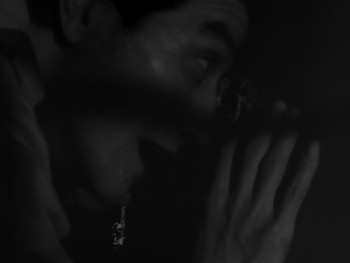
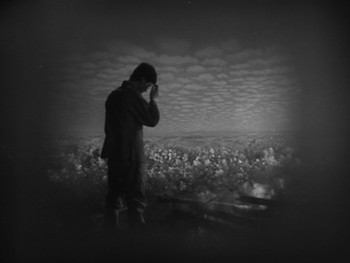
Yokota serves as a sort of social conscience for the film. He is literally a translator, being the one who speaks English, but symbolically this carries over to his being the character who theorizes about prison life and whose ideology evolves. He is the one who explains the experience to his comrades and, by extension, the audience. "Everybody's turning to dust little by little," he tells his brother. He sees the men who are locked up as growing more desperate, doing things they should otherwise be ashamed of to survive and inventing justifications to assuage their guilt. In the case of one of his roommates, Kawanishi (Kinzo Shin), the shame is too much. In The Thick-Walled Room's most visually memorable sequence, Kawanishi is left alone with his hallucinations. Holes are punched through the walls, like shotgun blasts coming from outside, and through each opening, the man sees his sins and the judgment of his fellow citizens. It's like he's under siege from his own memories. Suicide is a looming presence, and more than one man tries it as a means of escape.
Yamashita has the most direct example of injustice. His superior not only bullied him into murdering an innocent man, but he then testified against him in court. Interestingly, the crime the Americans treat as the most severe is his allegedly having stolen food. Yamashita is to be punished for stealing a loaf of bread, not unlike Jean Valjean in Les miserables [review]. There is a poetic connection between Yamashita and Yokota in that the American that Yokota was forced to beat was also being punished for stealing food to survive. The two men deal with things differently, however: Yokota is given to external expression, while Yamashita internalizes. It's somewhat ironic, then, that The Thick-Walled Room's major climax is Yamashita getting to confront his persecutor directly. The incident brings some closure, and his brief taste of freedom brings the man some peace, but at the same time, it provides no real answers.
It's a bittersweet conclusion. Yamashita returns to his cell ready to embrace his new family. The men who share his fate have made their own community, one that will provide them succor as they forge ahead while also reinforcing the sad truth that they are exiles in their own country.

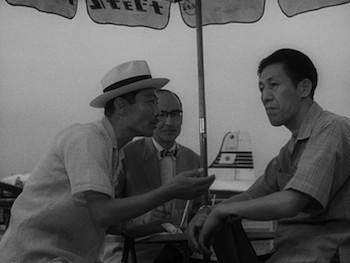
Released the same year The Thick-Walled Room finally got out of limbo, Masaki Kobayashi's I Will Buy You is more conventional in its drama, and though it has some commentary layered into its tale of greed and loyalty, the target is more specific. (To be fair, he made a handful of "safe" melodramas before working his way back to more meaningful territory.)
I Will Buy You is, for all intents and purposes, a baseball picture. But not one that spends much time on the field. In fact, we only see a couple of swings of the bat during it's near two-hour running time. Rather, I Will Buy You is more like an early prototype for Moneyball: it's about the men who control the purse strings and make the teams. It's capitalism as sport, with the players being substituted for the bat and ball
The script follows Daisuke Kishimoto (Keiji Sada, also in Kobayashi's masterwork, The Human Condition), a talent scout for the Toyo Flowers, a franchise in a small slump as their new, untested manager whips the squad into shape. Baseball is a ruthless business, and Kishimoto has to be practical in his decision-making. In the film's opening scenes, he is on his way to sign a pitcher who lives in the sticks, only to discover the boy has lost a finger working in a factory and turn away without seeing him.
Kishimoto next turns his sights on Goro Kurita (Minoru Ooki), a college player with a power hit. The entirety of the Japanese league has zeroed in on the boy, so Kishimoto is going to have to be clever. For the time being, Kurita has a gatekeeper, Ippei Kyuki (Yunosuke Ito, Sanjuro), his private coach for many years. On first meeting, Kyuki presents himself as a moral personage, concerned more for the boy's future than for his own personal gain. Initial impressions change, however--the longer Kishimoto courts Kyuki, the more flexible he finds the man. Baseball, it would seem, is not Kyuki's only game. Ignoring his penchant for gambling, he is most up-front about being in the import business, bringing fruit and other products from China. The rumors that he spied for China during the war may be born of jealousy, or they may be indicative of a truth where Kyuki really is a "leech" using Kurita for his own gain. It doesn't help that the married father's mistress (Mitsuko Mito, There Was a Father) is the sister of his prized pupil's girlfriend. In all of I Will Buy You, Fueko (Keiko Kishi, returning from The Thick-Walled Room) is the only one who we trust, and so her claims that Kyuki is faking his life-threatening gallstone affliction gives both us and Kishimoto pause. It's a bold statement from the lone figure who appears to be unimpeachably moral.
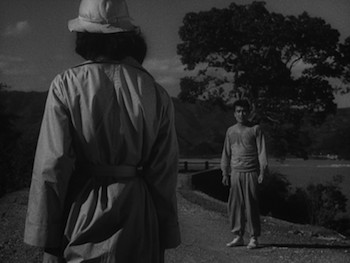
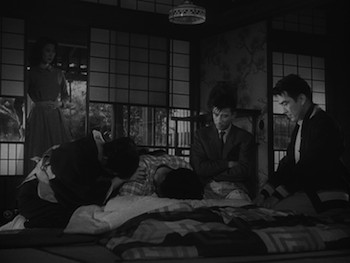
Except, then again, maybe not. By the end on I Will Buy You, it's hard to tell who exactly we are supposed to believe. Even Kishimoto, who is the one who is going to be learning his lesson over the course of this thing, and who also gets to share his true thoughts via voiceover, is still a little hard to fully trust. The entirety of I Will Buy You's story is basically an up-down, push-pull ethical fakeout. We know the talent scouts are lying, but can we believe the coach? What about the girlfriend? Or the baseball player's working class family? Only Goro Kurita escapes our suspicious gaze. Surely the cornfed boy is just a pawn! (I don't know any Japanese equivalent of "cornfed" that doesn't sound racist. Sorry.)
Hopefully I didn't make all that sound irresistible, because it's actually kind of dull. There is a good drama here. Both Sada and Ito are very good, and they feed each other well. If the coach is a con man, he never tips his hand, and with the scout so effectively communicating the ethical conflict, we know whose shoes we're supposed to try to walk in. The problem is, there is not enough variance in the story, nor enough legitimate tension beyond wondering who Kurita will sign with, to justify the extended running time. There is an excess of low-decibel villains, and a real deficit of heroes.
What impresses beyond the strong acting, however, is Kobayashi's increased confidence behind the camera. The director stages the mundane events with a journeyman's hand. The framing in the scene where Kurita finally reveals his decision is particularly impressive. Five characters in three different fields of vision all act and react without the technique overshadowing the content.
Then again, maybe more hot-dogging from the director, or even the writer, might have helped. To mention Moneyball again (which I Will Buy You definitely resembles way more than, say, Pride of the Yankees or Bull Durham), both Aaron Sorkin and Bennett Miller saw that they needed to kick the execution up a couple of notches above the subject. They found the energy in the dry landscape of business athletics that Kobayashi never takes off the bench.

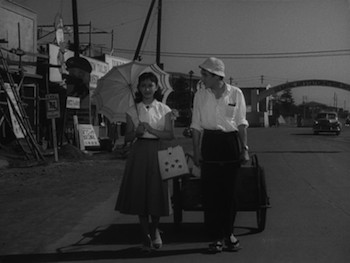
If Masaki Kobayashi were a Sinatra-style crooner, he'd have good cause to sing about how 1956 was a very good year. The third movie released in those twelve months, Black River, was his most confident yet, gathering up some of the pulpier aspects of the crime genre and arranging them on a contemporary Japanese landscape.
Set near a US naval base in Atsugi, Japan, Black River provides a searing look at the poverty and corruption that generated big business in many such neighborhoods around the country. Pimps, prostitutes, gamblers, and dealers all lurk in the military's shadow. Our hero, Nishida (Fumio Watanabe, also in The Human Condition) is an engineering student who moves to town in order to save money. He rents a squalid room in a rundown boarding house run by an opportunistic widow (Isuzu Yamada, Sisters of the Gion). She is a purposely grotesque character, outfitted with kitty-cat glasses and outrageous metal teeth, as much Dickens as she is noir. Yet, she is also the least scary of the movie's collection of villains. Her appearance is like a bell around a cat's neck--the mice can see her coming.
Nishida runs afoul of the real evil dude of Black River when he falls for Shizuko (Ineko Arima, Tokyo Twilight). The pretty young waitress has also caught the eye of Joe (Tatsuya Nakadai, High & Low), the slick would-be gangster that acts as the nexus for most of the local crime. Joe dresses in sporty suits and wears sunglasses, as if he were a movie star sunning himself in California rather than slumming on the outskirts of civilization. Not one to be beaten to the punch, Joe sets up an elaborate scenario where Shizuko is kidnapped by his cronies. He pretends to save her from their assault, but in a twisted twist, he rapes her himself. Now that he has "ruined" her, Shizuko begs him to do the right thing, but instead he plays with her emotions until she submits to being his. The girl is too ashamed to explain herself to Nishida, but the do-gooder will soon have plenty of other reasons to clash with his dark rival.
The love triangle described above would be enough to fill any standard crime picture, but Kobayashi and screenwriter Zenzo Matsuyama (who regularly collaborated with the director) are telling the story of a community as much as they are detailing a sordid love affair. Each resident of the shack Nishida lives in is a fully realized character, with both a personality and a purpose. Mr. Okada is the decent guy who turns a blind eye to bad goings-on, the cautionary tale for humiliating yourself in the name of love. His wife, Yasuko, masquerades as a hairdresser, but she's really just another prostitute catering to American GIs. Nishida witnesses her lust first-hand. In one overheated scene, she comes to his room to hit on him. Her seduction technique involves her literally fanning her vagina in his direction.
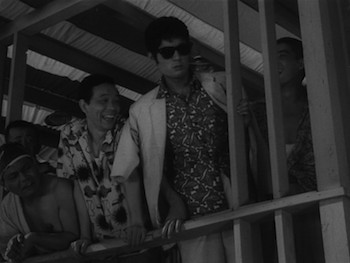
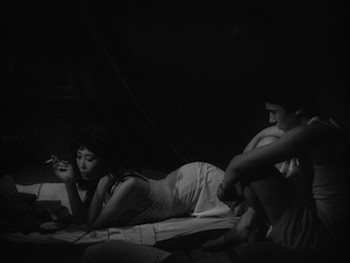
At the same time, her reason for coming on to Nishida may be a big contributor to why he sticks to his principles. Yasuko tells him that she wants to be with him because he's a real man. Unlike her husband, he knows what he wants and stands up for it. Another factor in fortifying Nishida's moral resolve is Mr. Kim, a family man and a communist who keeps the tenement running. He rails against the American base leeching off Japan's resources and forcing citizens like them to foot the bill, and he pushes the tenants to stand as one against the landlady. This becomes more necessary than ever when the slumlord sells the property to an outside crook so he can build another brothel, and she hires Joe to kick everyone out.
The demolition deadline, set on Joe's birthday, provides the opportunity for a showdown between the lovers and louts. Fed up with the thieves getting away with taking everything, Nishida makes his move--even as Shizuko is looking to carve out her own exit. The climax of Black River is one tense night of drinking, dancing, and sharpened tongues, leading to a surprising climax that is as dark as anything to be found in archetypical American film noir yet as beautifully shot as any closing image in a grand MGM spectacle.
Kobayashi's ensemble cast is note-perfect down to every last performer. The character actors who fill out the roster are all unique and assured, playing to type but yet managing to be stylized without being cartoony. Whether it's the landlady's victim routine, Mr. Kim's earnest speechifying, or Yasuko's breathless flirtation, there's some kind of tragedy behind every extreme behavior, and with that comes humanity.
Both Fumio Watanabe and Ineko Arima bring complexity to their portrayal of good people pushed to doing bad things. His nervous temper solidifies into righteous anger, just as the wanton mask she adopts to cover her humiliation turns to fierce determination. Even Joe, who, on the face of it, appears to exist just to be baaaaaad--and Tatsuya Nakadai is so good at it, too--runs on buried fear. He's really just a little boy dressing up as a cinematic tough guy.
Kobayashi handles the complicated plot deftly, fusing the story's hardboiled tropes with his political message using his Neorealist shooting style as the bond. His work here, particularly in how he handles the large cast, strikes me as more Renoir than Rossellini, but at the same time, the use of realistic locations grounds the melodrama so that neither the comedy nor the tragedy--and there is plenty of both--appears over the top. On the contrary, underneath all of the salacious manoeuvring is a yearning for honesty. Mr. Kim wishes the government would own up to what is really going on, just as Shizuko repeatedly tries and fails to come clean with Nishida. The cynicism of Black River, however, is that the outcome is the same whether you champion the truth or live the lie. Kim does no better than Okada, and Nishida, for all his morals, may come out with the least of all.

The last entry in the Eclipse box Masaki Kobayashi Against the System jumps ahead a few years from it's forebears, landing in 1962. It's the first film Masak Kobayashi made following his epic-length The Human Condition, and as if in response to the breadth of that story, Kobayashi chose a project that was purposely more compact in its scope, though no less complex or ambitious in substance.
The Inheritance is, in a way, a play on the traditional closed-door murder mystery: which of these suspects, all of whom had motive and opportunity, is guilty of the crime? The twist is there is no murder here, at least not centrally, the people of interest won't be directly responsible for the death of the man the majority of them will wrong. Wealthy businessman Senzo Kawara (So Yamamura, Tokyo Story) has been diagnosed with cancer and, at best estimate, will die within six months. Kawara has no official will, and before he will decide how he will divide his fortune, he must track down his three illegitimate children. Depending on how they turned out--they range in age from 7 to early 20s--and whether or not Kawara, no lie, actually likes them, he will give them a share of his estate. If not, it will go to charity.
The only person guaranteed a share is Kawara's wife, Satoe (Misako Watanabe, Take Aim at the Police Van). She was originally his secretary, and they married when she was younger and considered a trophy. She never had kids of her own with Kawara, and their current relations are, shall we say, testy. Satoe immediately begins scheming to cheat the kids out of their money. She has been charged with finding the youngest daughter, while Kawara's underling Furukawa (Tatsuya Nakadai, returning once again) is sent after the older girl. All of the people around Kawara, including his lawyer and his right-hand man, plot to find ways to keep all the cash where they can get their hands on it. They might not have to try all tht hard, though. The lost offspring themselves come with their own problems. Furukawa finds Mariko (Mari Yoshimura), but she's working as a nude model in a seedy club. Not exactly daddy's little girl!
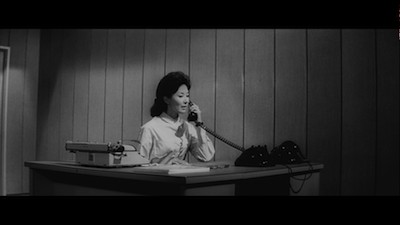
It would seem the dying man's most trusted confidante is his pure-hearted secretary Yasuko (Keiko Kishi again), the girl who replaced Satoe in the position. Kawara assigns Yasuko with finding his son, Narimune (Yusuke Kawazu, Fighting Elegy), and she takes the job seriously. The boy is a disappointment, as well, however: he is a juvenile delinquent who puts the moves on Yasuko. Like father like son, as it turns out: when she returns from the trip, Kawara also casts his lust toward Yasuko.
How the old man's advances and assumptions end up corrupting the sweet girl is reminiscent of how the gangster Killer Joe entrapped the waitress in Black River. Both men use the ladies' trust and expectations against them, leaving them with no other real option. Yasuko finds herself trapped in a cycle of abuse, and it has the unexpected side effect of also giving her bargaining chips with the other scoundrels, who see her increasing influence. Though Kobayashi directs The Inheritance as if it were a chamber room drama--and indeed, some of the events would not be out of place in a serious Bergman film--there is also something almost noirish to how the players maneuver and double-cross. As I suggested, it's like watching a murder mystery where everyone has some kind of blood on their hands, and as the story progresses, we narrow down the suspect pool. Other sins disqualify them from being able to commit the crime in question--stealing all the money for themselves.
In this, The Inheritance is more like I Will Buy You than Black River. The possibility of vast sums of money cause people to do wretched things to the person they allegedly care about. Cash corrupts, and in some aspects, the system itself is rigged. A lot of what Kawara's people attempt is a manipulation of the law. It's a mugging where the weapon is legalese. What disgusts Kobayashi most is how the pursuit of capital gains sullies everyone. Even Kawara's intention to donate to charity is a selfish impulse: he'd be scattering the money to the wind because he finds no one worthy of his lucre. Just like in I Will Buy You, the true puppet master in The Inheritance could end up being the person everyone least expects.
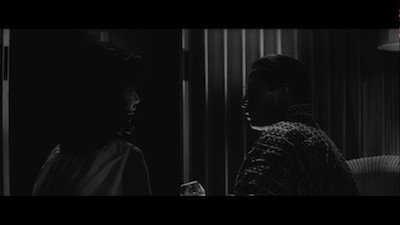
Of the quartet of films in Masaki Kobayashi Against the System, The Inheritance is the only one shot in widescreen. The director uses the extended frame to open up the rooms where the narrative plays out, almost as if these large spaces are indicative of the excess of the upper classes. Compared to the cramped residences of the characters in all three of the other films, including the jail cell in The Thick-Walled Room, here the bad guys can stretch out and plan their evil deeds. Money has even bought them the time to do it. Yasuko starts to lose her way when she loses her sense of purpose, when her boss' condition means she no longer has her daily work routine. The devil and idle hands, you know? Perhaps the director is also saying something in how blasé everyone is about what is happening. All of the performers play their roles with a particular restraint. They are laid back about their thievery, they don't have the desperation of survival.
This, of course, separates them from the artist that brought them to life. Masaki Kobayashi's victories were hard-won, coming from The Thick-Walled Room being shelved to actually pulling off something like The Human Condition in less than a decade. His next move would be to shift into historical drama, with Harakiri soon to follow The Inheritance, but the change of timeframe would do nothing to dull the bite he developed cutting his teeth in the early movies in Masaki Kobayashi Against the System. That the last film, The Inheritance, seems so effortless is only a testament to what a vital filmmaker Kobayahi had become.
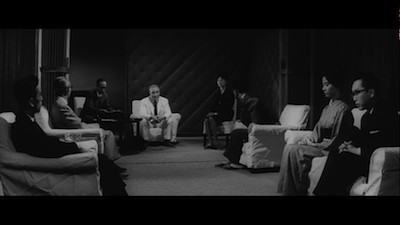
THE DVD
Video:
All four movies collected in the Eclipse Series 38 box were originally shot in black-and-white. The trio from the 1950s were filmed at 1.33:1 aspect ratio, full frame. Despite the fact that the Eclipse boxes don't boast full-fledged restorations, all of these older movies look really good, with sharp resolution excellent balance between light and dark. The moody photography always looks great, with the right details evident and the blacks appearing solid. There are some marks on the prints, particularly The Thick-Walled Room, but nothing too distracting.
The Inheritance is the one widescreen presentation, shown here at its original 2.40:1 ratio. I see nothing to complain about here. The image quality is crisp and clean from start to finish.
Sound:
All four movies have had their original soundtrack mixed in mono for home video. The presentation is solid, with no glitches, hiss, or drop-outs. Subtitles are nicely written and easy to read.
Extras:
Each film comes in its own slimline case and they are held in a slip cover that loads top or bottom. The only extras are the informative liner notes in the cases.
FINAL THOUGHTS:
Highly Recommended. Masaki Kobayashi Against the System collects three early period films from the great Japanese director, and one middle period triumph, making for a solid set of movies that ranges from pulp to baseball and the jailhouse to the board room. The earlier selections show us a talent in development, whereas the last gives us an image of an artist who has arrived. All are worth exploring, with Black River and The Inheritance being particularly essential.
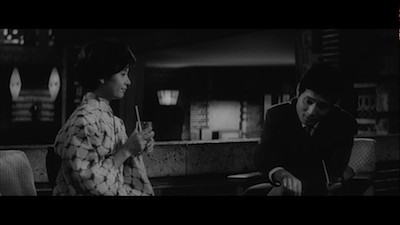
Jamie S. Rich is a novelist and comic book writer. He is best known for his collaborations with Joelle Jones, including the hardboiled crime comic book You Have Killed Me, the challenging romance 12 Reasons Why I Love Her, and the 2007 prose novel Have You Seen the Horizon Lately?, for which Jones did the cover. All three were published by Oni Press. His most recent projects include the futuristic romance A Boy and a Girl with Natalie Nourigat; Archer Coe and the Thousand Natural Shocks, a loopy crime tale drawn by Dan Christensen; and the horror miniseries Madame Frankenstein, a collaboration with Megan Levens. Follow Rich's blog at Confessions123.com.
|
| Popular Reviews |
| Sponsored Links |
|
|
| Sponsored Links |
|
|
| Release List | Reviews | Shop | Newsletter | Forum | DVD Giveaways | Blu-Ray | Advertise |
|
Copyright 2024 DVDTalk.com All Rights Reserved. Legal Info, Privacy Policy, Terms of Use,
Manage Preferences,
Your Privacy Choices | |||||||














